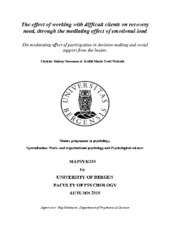The effect of working with difficult clients on recovery need, through the mediating effect of emotional load
Master thesis
Permanent lenke
https://hdl.handle.net/1956/11973Utgivelsesdato
2016-02-15Metadata
Vis full innførselSamlinger
Sammendrag
Service occupations have been highlighted as a vulnerable profession with respect to stress. Recovery need is a natural consequence of normal work efforts, but can be detrimental to wellbeing if the work efforts goes beyond normal amounts. Hence, it is important to identify resources that can aid in keeping recovery need low. The objectives of this study are 1) To investigate the correlation between working with difficult clients, emotional load and need for recovery among bank employees. 2) To investigate whether participation in decision-making and/or social support from the leader could decrease this effect. Participants were recruited by e-mail. They filled out the Short Inventory for Measuring Psychosocial Hazards (SIMPH), which is a self-report questionnaire. Data was analysed using PROCESS, an add-on software for moderation analyses in SPSS. The relationship between contact with difficult clients and recovery need was partially mediated by emotional load. Participation in decision-making and social support from the leader did not moderate the relationship between contact with difficult clients and emotional load. They enhanced the relationship between emotional load and recovery need when tested in isolation, but acted as a buffer when tested together. Participation in decision-making and social support from the leader weakened the direct relationship between contact with difficult clients and recovery need in isolation in two of the analyses, but not in the final analysis. The interaction of the double moderation was not significant when they were tested together on the direct relationship. Serviceyrker har blitt løftet frem som en sårbar yrkesgruppe i forbindelse med stress. Behovet for å hente seg inn etter en arbeidsdag er en naturlig konsekvens av normal arbeidsinnsats, men kan ha negativ innvirkning på velvære dersom det overgår normale mengder. Det er derfor viktig å identifisere ulike ressurser som kan bidra i å holde behovet for å hente seg inn, lavt. Målene for denne studien er 1) Å undersøke korrelasjonen mellom å jobbe med vanskelige klienter, emosjonell belastning og behov for å hente seg inn blant bankansatte. 2) Å undersøke hvorvidt deltakelse i beslutningstaking og/eller støtte fra lederen kan redusere denne effekten. Deltakerne ble rekruttert via mail. De fylte ut Short Inventory for Measuring Psychosocial Hazards (SIMPH), som er et selvrapport- spørreskjema. Data ble analysert ved bruk av PROCESS, som er et programvaretillegg for moderasjonsanalyser i SPSS. Forholdet mellom kontakt med vanskelige klienter og behovet for å hente seg inn var delvis mediert av emosjonell belastning. Deltakelse i beslutningstaking og sosial støtte fra leder modererte ikke forholdet mellom kontakt med vanskelige klienter og emosjonell belastning. De forsterket forholdet mellom emosjonell belastning og behov for å hente seg inn når de ble testet i isolasjon, men svekket forholdet når de ble testet sammen. Deltakelse i beslutningstaking og sosial støtte fra leder svekket det direkte forholdet mellom kontakt med vanskelige klienter og behov for å hente seg inn når de ble testet i isolasjon i to av analysene, men ikke i den siste analysen. Interaksjonen av den doble modereringen var ikke signifikant når de ble testet sammen på det direkte forholdet.
